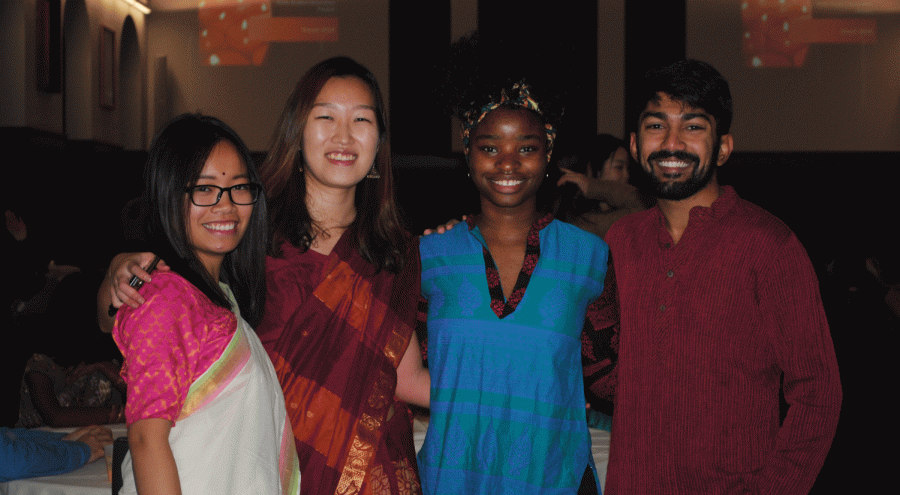Diwali Celebration Lights Up Campus
If you heard cacophonous booming sounds from the sky on Saturday, November 3, you were probably listening to the fireworks from the commencement of Colgate’s annual Diwali celebration. Community members gathered outside the Hall of Presidents (HOP) at 6:30 p.m. to kick off the celebration by watching the glittering lights.
Upon entering the HOP, attendees were greeted with a rangoli: a colorful art form created on the floor, typically at the entrances of homes during Hindu festivals. This decoration is thought to bring good luck. The entire room was filled with sparkling grey chairs and tables with small candles. Traditionally, oil lamps would be used to create light and represent goodness during festivals.
Once everyone was seated, the President of the Hindu Students’ Association, senior Araven Tiroumalechetty, welcomed everyone and introduced sophomores Yucheng Lu and Jailekha Zutshi to give context for the festival.
Lu spoke about the origins of Diwali. In the story, the evil king Ravana—who was feared for his wrath, 20 arms and ten heads—kidnapped Prince Rama’s wife. His wife left a trail of shining jewels that Rama was able to follow to find her. Along the way, Rama met the monkey king who alerted all of the monkeys and bears in the world to search for Prince Rama’s wife.
Eventually, they discovered that Prince Rama’s wife was locked away on an island. The island was too far to reach, so the monkeys, bears and all other animals on earth came together to build a bridge. When the bridge was complete, they crossed it and fought in the battle in which Prince Rama slew the evil King Ravana. After the battle, Rama travelled back home with his wife and was guided by oil lamps.
Zutshi explained that this is why Diwali is thought of as the celebration of light over dark and good over evil. Zutshi also connected the story to the candle decorations we saw around the room. Setting off fireworks is a modern interpretation of the celebration of light. However, this practice is fading in India because of a concern for pollution. A more traditional practice is to burn down statues of Ravana to represent his defeat by Rama. People also exchange gifts and sweets during this celebration, which represents the start of the new year.
Retelling the story behind Diwali was vital to the audience’s understanding of the celebration, as most of the people at the gathering did not practice Hinduism. President Tiroumalechetty even noted that many members of the Hindu Students’ Association do not identify as Hindu, but they are interested in learning about the religion and cultural practices.
“I’m really glad about the support we get because we don’t have that many Hindu students, but every year over 300 students, staff, friends and neighbors come celebrate,” Tiroumalechetty said.
Before guests left their seats in search of food, a religious leader performed prayers while lighting candles to worship gods and goddesses. Everyone in the room was fixated on the ceremony and listened without distraction. The attentiveness in this moment seemed to represent the deep community support for all of the cultures that are represented at Colgate.
The celebration culminated with a dinner of both vegetarian and meat options, as the holiday is traditionally celebrated without meat. Community members shared conversations and some even danced to the upbeat music, which included the song “Buddhu Sa Mann” by Kapoor & Sons.
Although there was the fun of food and dance, many students chose to also embrace the holiday traditions and support their friends. When a group of students met up with a friend wearing a vividly colored saree, one said in support, “This is beautiful. This is really why we came.”
Contact Marissa Volkman at [email protected].
Marissa Volkman is a senior from Long Island, New York concentrating in English literature and double minoring in philosophy and writing and rhetoric....






